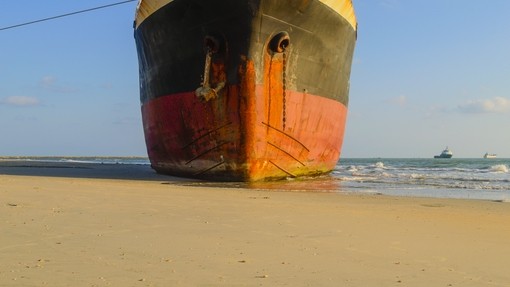Navigator Spirit SA –v- Five Oceans Salvage SA (The “FLAG METTE”) [2018] EWHC 1108 (Comm)

Details
The Commercial Court in this case considered an application by Navigator Spirit SA, the owners of the “FLAG METTE” to set aside an appeal arbitrator’s award in a salvage remuneration claim. The key question was whether the appeal arbitrator had breached his obligation to act fairly under section 33 of the Arbitration Act 1996 by taking into account dangers which, it was claimed, had not featured in either the grounds of appeal or in the appeal hearing.
Factual background
In December 2016 the “FLAG METTE” was in the course of her second laden voyage from Kamsar in Guinea to Stade in Germany. On 20 December the vessel was in the northern sector of the Bay of Biscay when its main engine spontaneously shut down. The casualty ship contacted the respondent salvage company, Five Ocean Salvage (the salvors) and entered into a Lloyd’s Open Form of salvage agreement (LOF).
Salvage was claimed and the assessment of the sum due was referred to arbitration. At this first instance arbitration the salvors contended for two dangers, namely that the casualty was: a) temporarily immobilised and in need of assistance from professional salvors; and b) subject to a low order risk of collision had she attempted to transit the English Channel unassisted. The arbitrator rejected the risk of collision, holding that there was no evidence of any intention to contemplate a Channel transit without assistance, but agreed with the salvors’ former argument and found that a fair and encouraging award was $825,000 together with an agreed currency uplift of 3.76%.
The salvors appealed on the basis that the first instance arbitrator wrongly rejected the second danger and had he properly considered the absence of any alternative assistance, he would have concluded that it was probable that the casualty would have had to contemplate a Channel transit, however dangerous, because she had no alternative. The appeal arbitrator rejected the salvors’ submission but proceeded to reconsider the question of dangers and allowed the appeal, holding that, in the absence of assistance, the casualty would have waited offshore for tug assistance instead of at anchor in the bay, which would have given rise to dangers not taken into account at the arbitration, namely a prolongation of the period of immobilisation and an increased risk of collision. The appeal arbitrator decided that if the situation had been analysed in that way, the dangers to which the casualty was exposed would have been found to be a little higher than those found by the arbitrator at first instance and concluded that a fair and encouraging award was $1.2 million together with an agreed currency uplift of 3.76%.
The owners applied to the High Court to set aside the appeal arbitrator’s award alleging that the arbitrator failed to comply with his duty to act fairly under section 33 of the Arbitration Act 1996. They claimed that the award on appeal was affected by a serious irregularity under section 68(2)(a) of the Arbitration Act 1996 as it was allowed on grounds which had featured neither in the grounds of appeal nor in the appeal hearing.
Legal issues
Section 33 of the Arbitration Act 1996 required the tribunal to act fairly. In the case of Terna Bahrain Holding Company WLL –v- Al Shamsi [2013] 1 Lloyd’s Reports 86 it was established that there would generally be a breach of section 33 where the tribunal decided the case on the basis of a point which one party had not had a fair opportunity to deal with. However, a distinction was drawn between ‘a party having no opportunity to address a point, or his opponent’s case, and, a party failing to recognise or take the opportunity which exists’. The latter would not involve a breach of section 33.
In the present case the owners contended that the appeal was decided on the basis of two dangers with which their counsel did not have a fair opportunity to deal. However, as discussed by the Court of Appeal in The Magdalena Oldendorff [2009] 1 Lloyd’s Reports 7, the issue should be viewed from the appeal arbitrator’s perspective and not from the point of view of the parties or their lawyers. The appeal arbitrator, in the instant case, did not consider that either party had correctly identified the hypothetical scenario in which the dangers facing the casualty were to be assessed, but after carefully considering the grounds of appeal he found an alternative scenario against which to assess the dangers. The judge held that the arbitrator plainly endeavoured to act fairly by putting that scenario to both parties and he had no obligation to check whether the parties’ counsel were aware of the risks arising from it. Mr Justice Teare commented that it was impossible to say that the conduct of the appeal arbitrator was so far removed from what could reasonably be expected of the arbitral process that justice called out for it to be corrected, especially in the context of a salvage arbitration under LOF.
The judge proceeded to consider whether the suggested serious irregularity had caused substantial injustice. He suggested that this depended upon whether, had the Owners’ counsel addressed the dangers which the appeal arbitrator had in mind, the latter might have reached a different view and produced a significantly different outcome. Mr Justice Teare was unpersuaded that there was a realistic chance the outcome would have been different and thus, dismissed the owners’ application.
Comment
This case highlights the principle established in the case of Terna Bahrain Holding Company WLL –v- Al Shamsi [2013] 1 Lloyd’s Reports 86, that a distinction should be drawn between a party having no opportunity to address a point, or his opponent’s case and a party failing to recognise or take an existing opportunity. The court reminded parties that the latter will not involve a breach of section 33 and found that this will be the case even when an arbitrator takes into account dangers which had featured neither in the grounds of appeal nor in the appeal hearing.
The decision of the Commercial Court also highlights the significance of understanding the context within which an arbitration agreement operates. In his judgment, Mr Justice Teare specified that this dispute arose from a salvage arbitration under LOF and took into account the unique characteristics of such arbitrations. It would be interesting to see if the same rationale will be followed outside this context.
This article originally appeared in the July 2018 edition of shipping case digest. Other articles include:
Dera Commercial Estate -v- Derya Inc (The “SUR”) [2018] EWHC 1673 (Comm)
Songa Chemicals AS -v- Navig8 Chemicals Pool Inc [2018] EWHC 397 (Comm)






